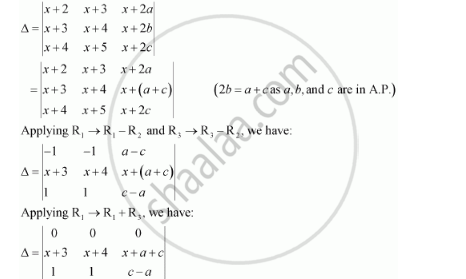Advertisements
Advertisements
Question
Choose the correct answer.
If a, b, c, are in A.P., then the determinant
`|(x+2, x+3,x +2a),(x+3,x+4,x+2b),(x+4,x+5,x+2c)|`
A. 0
B. 1
C. x
D. 2x
Solution
Answer: A

Here, all the elements of the first row (R1) are zero.
Hence, we have Δ = 0.
The correct answer is A.
APPEARS IN
RELATED QUESTIONS
If ` x in N and |[x+3,-2],[-3x,2x]|=8` , then find the value of x.
Evaluate the determinant.
`|(cos theta, -sin theta),(sin theta, cos theta)|`
Evaluate the determinant.
`|(x^2-x+1, x -1),(x+1, x+1)|`
If A = `[(1,2),(4,2)]` then show that |2A| = 4|A|
Evaluate the determinant.
`|(3,-1,-2),(0,0,-1),(3,-5,0)|`
Evaluate the determinant.
`|(0,1,2),(-1,0,-3),(-2,3,0)|`
Evaluate the determinant.
`|(2,-1,-2),(0,2,-1),(3,-5,0)|`
If `|(x, 2),(18, x)| = |(6,2),(18,6)|`, then x is equal to ______.
Prove that the determinant `|(x,sin theta, cos theta),(-sin theta, -x, 1),(cos theta, 1, x)|` is independent of θ.
Evaluate `|(cos alpha cos beta, cos alpha sin beta, -sin alpha),(-sin beta, cos beta, 0),(sin alpha cos beta, sin alpha sin beta,cos alpha )|`
If a, b and c are real numbers, and triangle =`|(b+c, c+a, a+b),(c+a,a+b, b+c),(a+b, b+c, c+a)|` = 0 Show that either a + b + c = 0 or a = b = c.
Solve the equations `|(x+a,x,x),(a,x+a,x),(x,x,x+a)| = 0, a != 0`
Prove that `|(a^2, bc, ac+c^2),(a^2+ab, b^2, ac),(ab, b^2+bc, c^2)| = 4a^2b^2c^2`
In question 18, write the value of a11 C21 + a12 C22 + a13 C23.
If A is a square matrix satisfying AT A = I, write the value of |A|.
A is a skew-symmetric of order 3, write the value of |A|.
If A, B, C are three non-null square matrices of the same order, write the condition on A such that AB = AC⇒ B = C.
One root of the equation `abs ((3"x" - 8, 3,3),(3, 3"x" - 8, 3),(3,3,3"x" - 8)) = 0` is ____________.
If A `= [(2,3),(3,4)],` then find A-1.
Find a 2 x 2 matrix B such that B `= [(1, -2),(1,4)] = [(6,0),(0,6)]`
Let A = `((cos^2x, sin^2x),(sin^2x, cos^2x))` and B = `((sin^2x, cos^2x),(cos^2x, sin^2x))`. Then the determinant of the matrix A + B is
Find the value of 'x' for which `|(3, x),(x, 1)| = |(3, 2),(4, 1)|`
If `|(x, 2),(18, x)| = |(6, 2),(18, 6)|`, then 'x' is equal to
There are two number 'x' making the value of the `|(1, -2, 5),(2, x, -1),(0, 4, 2x)|` equals to 86. The sum of there two number, is:
